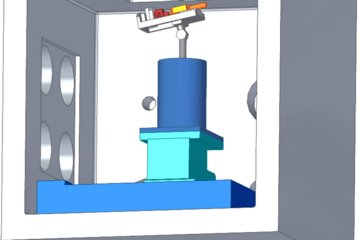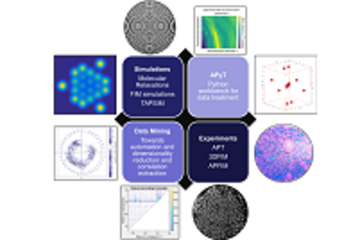All genres
41.
Talk
Towards an ab initio based understanding of deformation mechanisms in high-manganese Steels. 1st Int. Conf. on High Manganese Steels, Seoul, South Korea (2011)
42.
Talk
Finite temperature magnetism combining first-principles and spin Quantum Monte Carlo. DPG Frühjahrstagung, 2011, Dresden, Germany (2011)
43.
Talk
First principles study of elastic properties of eutectic Ti-Fe alloys up to their mechanical stability limits. DPG Spring Meeting 2011, Dresden, Germany (2011)
44.
Talk
First principles concepts to calculate thermodynamic properties of magnetic materials. ICAMS Advanced Discussions, Bochum, Germany (2011)
45.
Talk
Combining ab initio calculations and high-resolution experiments to understand advanced Mg alloys. German-Korean workshop on the “Production and industrial applications of semi-finished Mg products”, Irsee, Germany (2011)
46.
Talk
Thermodynamic data of Fe-based alloys derived from first principles. MRS Spring Meeting 2010, Boston, MA, USA (2010)
47.
Talk
Crystal mechanics of the martensitic transformation: Crystal plasticity, ab initio models, experiments. Colloquium Lecture, Institute for Mechanics, University of Dortmund, Dortmund, Germany (2010)
48.
Talk
Towards an ab initio based understanding of deformation mechanisms in high-manganese steels. International scientific seminar “Ab initio Description of Iron and Steel: Mechanical properties”, Ringberg, Germany (2010)
49.
Talk
Phase stabilities of metals at finite temperatures: Ab initio meets CALPHAD. 468. WE-Heraeus-Seminar, Ab intio Description of Iron and Steel (ADIS2010): Mechanical Properties, Ringberg, Germany (2010)
50.
Talk
Ab initio based multi-scale approaches to the elasticity of polycrystals. ICAMS Scientific Retreat, Akademie Biggsee, Attendorn, Germany (2010)
51.
Talk
Integrating finite temperature magnetism into ab initio free energy calculations. ICAMS Scientific Retreat, Akademie Biggesee, Attendorn, Germany (2010)
52.
Talk
First-principles study of the Ti-Fe eutectic system. Seminar at Institute of Physics of Materials at Czech Academy of Sciences, Brno, Czech Republic (2010)
53.
Talk
Ab Initio Interfacial Austenite/Martensite Energies for Accurate Deformation Mechanism Maps in High-Mn Steels. Materials Science and Engineering 2010, Darmstadt, Germany (2010)
54.
Talk
The thermodynamics of Fe-based compounds derived from first principles. Materials Science and Engineering 2010, Darmstadt, Germany (2010)
55.
Talk
First-principles study of the Ti-Fe eutectic system. Materials Science and Engineering 2010, Darmstadt, Germany (2010)
56.
Talk
Using ab initio methods to predict thermodynamic properties of metals. Summer School: Computational Materials Science, San Sebastian, Spain (2010)
57.
Talk
Ab initio Bestimmung thermodynamischer Eigenschaften des Legierungssystems Fe-Mn-C. Sitzung FA Computersimulation der DGM, Aachen, Germany (2010)
58.
Talk
Atomistic study of martensite stability in dilute Fe-based solid solutions. PTM 2010 (Solid-Solid Phase Transformations in Inorganic Materials), Avignon, France (2010)
59.
Talk
First principles concepts to determine the heat capacity of Fe-based alloys. Calphad XXXIX, Jeju Island, South Korea (2010)
60.
Talk
Impurity ordering in iron: An ab initio based multi-scale approach. GraCoS Workshop (Carbon and Nitrogen in Steels: Measurement, Phase Transformations and Mechanical Properties), Rouen, France (2010)











